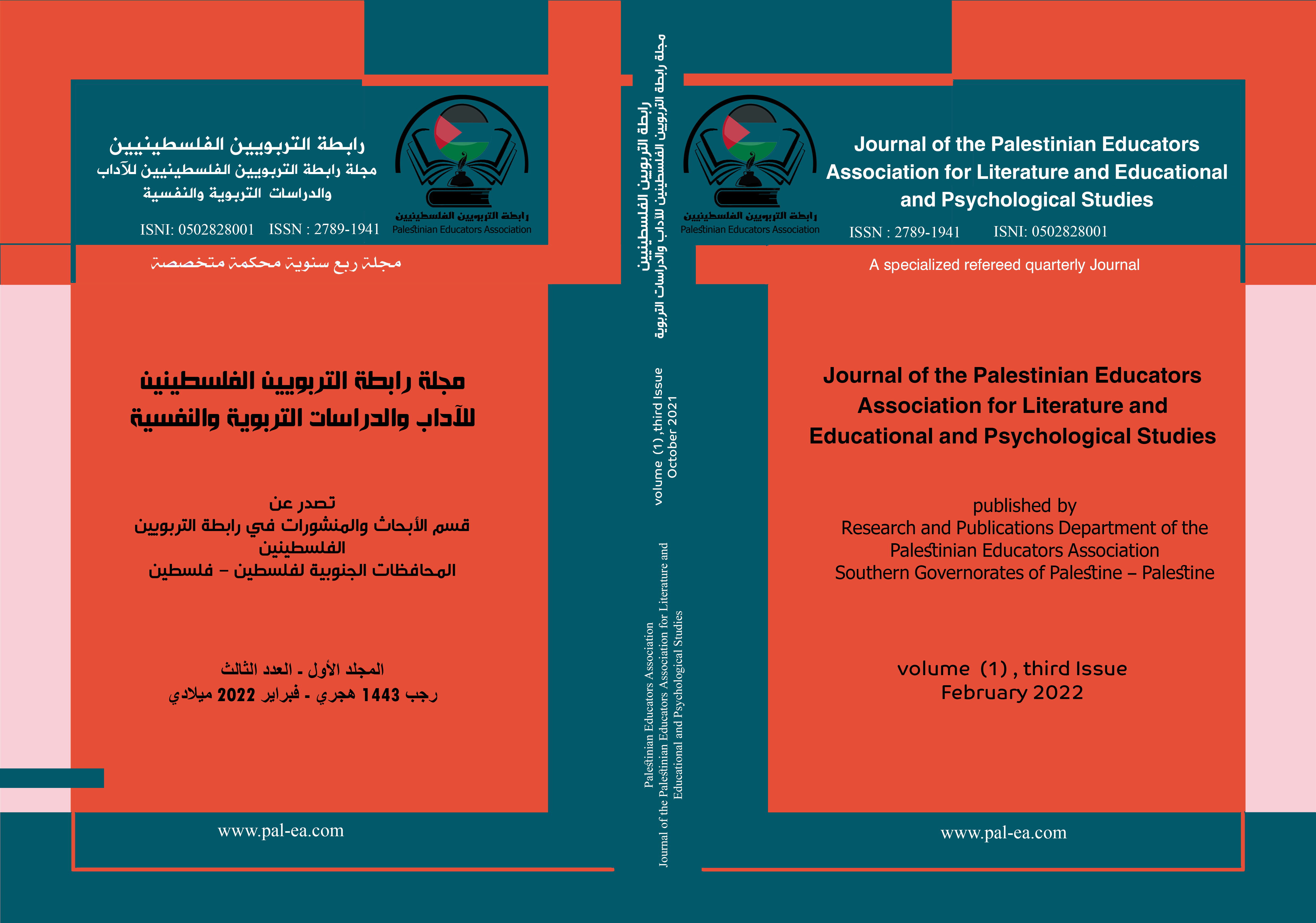The impact of using creative strategies to adapt distance education in the face of crises
DOI:
https://doi.org/10.69867/PEAJ026Keywords:
Distance Learning, Emergency Learning, COVID-19 Crisis, Teaching Strategies.Abstract
This study aimed at examining creative teaching strategies in the face of crises by answering a set of qualitative questions, as the researchers relied on the qualitative analytical approach in the study by conducting interviews and surveys with students and their parents regarding distance learning and strategies for its activation, and proposals to harmonize the education plan in emergencies during the COVID 19 crisis. The results showed the effectiveness of learning strategies used to learn students and enhance their attitudes towards distance learning, and their effectiveness in facing the challenges associated with learning. The researchers recommended the need to adopt an educational platform for all schools for distance learning in emergency situations, and to work on continuing teacher training to use distance learning applications.
Downloads
References
المصادر والمراجع
أولاً: المراجع العربية:
أمان، الائتلاف مـن أجـل النزاهـة والمساءلة. (2020). السياسات الحكومية تجاه التعليم عن بعد
في المدارس أثناء أزمة كورونا، رام الله، فلسطين
دعدوع، شهيرة (2021). التعلم عن بعد. أخذ من الإنترنت من الموقع: https://mawdoo3.com/
المعهد الوطني للتدريب التربوي. (2020). المجمع التدريبي الثامن. دبلوم تأهيل المعلمين، وزارة
التربية والتعليم، فلسطين.
سحمراني، عصام (2020)، مدارس كورونا حالة طوارئ بسبب الوباء العالم، مجلة العربي الجديد.
أخذ من الإنترنت من الموقع: https://www.alaraby.co.uk/portal
اليونسكو (2020). اضطراب التعليم بسبب كوفيد-19 والتصدي له: البوابات الوطنية التي تساعد
على استمرارية التعليم في أثناء إغلاق المدارس بسبب جائحة كوفيد-19. منصات وأدوات التعلم الوطنية – الصين. أخذ من الإنترنت من الموقع: https://ar.unesco.org/covid19/educationresponse
المراجع العربية الإنجليزية
AMAN, The Coalition for Integrity and Accountability. (2020). Government policies towards distance education in schools during the Corona crisis, (in Arabic), Ramallah, Palestine
Da'doua, Sh (2021). Distance Learning. (in Arabic), taken from the Internet from the website: https://mawdoo3.com/
National Institute for Educational Training. (2020). The eighth training complex. (in Arabic), Teacher Qualification Diploma, Ministry of Education, Palestine.
Sahmarani, P (2020), Corona schools are an emergency due to the global epidemic, (in Arabic), Al-Araby Al-Jadeed Magazine. Taken from the Internet from the website: https://www.alaraby.co.uk/portal
UNESCO (2020). Education Disruption and Response to COVID-19: National Gateways to Help Continue Education During School Closures Due to the COVID-19 Pandemic (Arabic), National Learning Platforms and Tools - China. Taken from the Internet at: https://ar.unesco.org/covid19/educationresponse
المراجع الأجنبية:
Anderson, A. (2020). COVID-19 Outbreak Highlights Critical Gaps in School
Emergency Preparedness. Brookings Journal. Retrieved from:
https://www.brookings.edu/blog/education-plus-dvelopment/2020/03/11/covid-19-outbreak
Batanero, C. de-Marcos, L. Holvikivi, J. Hilera, Jose R. & Oton, S. (2019). Effects of
New Supportive Technologies for Blind and Deaf Engineering Students in Online Learning. IEEE Transactions on Education, 62 (4), 270-277.
Bravo, J. Lutomia, A. Madela, L. & Pittendrigh, B. (2017). Malaria Prevention and
Treatment Using Educational Animations: A Case Study in Kakamega County, Kenya. International Journal of Education and Development using Information and Communication Technology (IJEDICT), 13 (1), 70-86.
Creed, C. & Louise, R. (2014). Morpeth Continuity Education in Emergency and Conflict
Situations: The Case for Using Open, Distance and Flexible Learning. Journal of Learning for Development, 1 (3).1-12.
Iqbal, K. Khalil, U. & Kha, A. (2017). Perceptions of Secondary School Teachers
Regarding the Role of Education in Social Conflict Resolution. Bulletin of Education and Research, 39 (3), 157-170.
Jaradi, H. (2016). Identification of Information Types and Sources by the Public for
Promoting Awareness of Middle East Respiratory Syndrome Coronavirus in Saudi Arabia, Health Education Research, 31 (1).
Lynch, T. (2016). United Nations Sustainable Development Goals: Promoting Health and
Well-Being through Physical Education Partnerships. Cogent Education, 3 (1).
Ogundele, M. (2014). Baneful Effects of Social Crises on Adult Education Goals’
Achievement in Nigeria. Journal of Education and e-Learning Research, 1 (1), 1-4.
Tao, H. Barraza, J. & Barrios, B. (2017). Education Programs in Post-Conflict
Environments: A Review from Liberia, Sierra Leone, and South Africa. Educare Electronic Journal, 21(1), 1-22.
UNESCO. (2020). How is China Ensuring Learning when Classes are Disrupted by
Coronavirus? Retrieved from the Internet:
https://en.unesco.org/news/how-china-ensuring-learning-when-classes-are-disrupted-coronavirus.
UNICEF. (2020). Key Messages and Actions for COVID-19 Prevention and Control in
Schools, Education in Emergencies.
World Bank. (2020). Managing the Impact of COVID-19 on Education Systems Around
the World: How Countries are Preparing, Coping, and Planning for Recovery. Retrieved from: https://blogs.worldbank.org/education/managing-impact-covid-19-education-systems-around-world-how-countries-are-preparing.
World Health Organization. )2016 .(Sustainable Development Goals: 17 Goals to
Transform our World. Retrieved from: http://www.un.org/sustainabledevelopment/health.
Zhang, W. Wang, Y. Yang, L. & Wang, C. (2020). Suspending Classes Without
Stopping Learning: China’s Education Emergency Management Policy in the COVID-19 Outbreak. Journal of risk and financial management. 13, 55; doi:10.3390/jrfm13030055.
Zhaohui, W. (2020). How is a Top Chinese University Responding to Coronavirus?
Website: https://youtu.be/yqpp7M9d03c
Website: https://www.facebook.com/100069110701003/videos/366418591548139
Downloads
Published
Issue
Section
License

This work is licensed under a Creative Commons Attribution-NonCommercial-ShareAlike 4.0 International License.
The Journal of the Palestinian Educators Association for Literature, Educational and Psychological Studies
E-issn: 2789-1941
Authors retain Copyright
The Journal of the Palestinian Educators Association for Literature, Educational and Psychological Studies allows Authors retain Copyright and grant the journal right of first publication with the work simultaneously licensed under a Creative Commons Attribution (CC-BY) 4.0 License that allows others to share the work with an acknowledgment of the work’s authorship and initial publication in this journal.
Provided they are the owners of the Copyright to their work, authors are able to enter into separate, additional contractual arrangements for the non-exclusive distribution of the journal’s published version of the work (e.g., post it to an institutional repository, in a journal or publish it in a book), with an acknowledgment of its initial publication in this journal.
Authors are permitted and encouraged to post their work online (e.g., in institutional repositories, disciplinary repositories, or on their website) prior to
and during the submission process.










